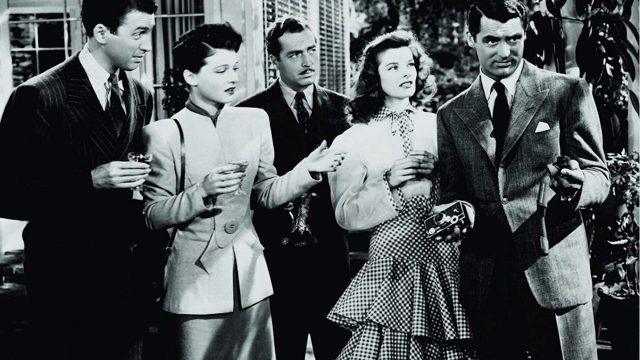I have a friend whose mother didn’t want him exposed to American culture. (He’s half-Japanese; his mom, obviously, is the Japanese half.) I met him around the time he graduated from college, and in the years since then, I’ve been ignoring his mother’s wishes and filling in his American pop culture blind spots. When I learned that he’d never seen a Katharine Hepburn movie, never seen a Cary Grant movie, never seen a James Stewart movie, there was really only one place to start. The one movie the trio did together. And of course he’s seen all sorts of movies with them after that, but I chose wisely anyway, because he still comes back to this well.
Some time before the main story started, Tracy Lord (Hepburn) and C. K. Dexter Haven were married, sailed the yacht the True Love, divorced. Now, she is marrying a Man Of The People, George Kittredge (John Howard). Dex, who works for the magazine Spy (not the actual one of later vintage, of course), arranges to sneak in reporter Macaulay “Mike” Connor (Stewart) and photographer Elizabeth Imbrie (Ruth Hussey), claiming they’re associates of Tracy’s brother Junius (Not Appearing In This Film). Tracy’s no dummy and knows they’re not, but her father, Seth Lord (John Halliday), has left her mother for a dancer, and if it’s not her wedding, it’ll be her father’s affair.
Dex is obviously still in love with Tracy. Mike falls in love with Tracy. George probably wants to marry her. And Tracy knows that she has to hide the family’s secrets as much as she can, so she does what she can to distract Mike. The night before the wedding, she and Mike get gloriously drunk, leading to a whole bunch of truths’ being revealed.
And, honestly, some really hard treatment of Tracy. It seems sometimes that though the various men of the movie love her, it’s only her little sister Dinah (Virginia Weidler) who really likes her. It’s basically implied at times that every man in the movie is justified in misbehaving because it’s not right for Tracy to have expectations of his behaviour. Even her father’s affair; he ran away with a dancer not because he’s facing a midlife crisis or because he really loves the dancer or what have you but because he can’t achieve the standards Tracy has for him and therefore has no reason to be a decent person.
But if you can get beyond that, my goodness this is a delightful film. (And that aspect is a lot more subtle in the movie than in its Lux Radio Theatre adaptation, which also guts Dinah’s character, thereby showing it doesn’t understand the best bits of the film.) For one, it is the only time those three shining lights of Classic Hollywood all worked together, though Hepburn and Grant did several other times. And were scintillating every time. It’s also got a whimsical performance by Roland Young as the hapless Uncle Willie.
The idea that a couple would divorce, flirt outrageously with other people, and remarry is one of those things that’s basically adapting old sex comedies for the Code years—they can’t have affairs, so they divorce instead, but you can’t make fun of divorce, so they have to remarry at the end. I’m not going to say that sort of thing never happened—my own grandmother was married four times, first and last to my grandfather—but it did seem to happen a lot more in movies of the ’30s and ’40s than in, you know, life.
A recurring word in this movie is “yar,” which is apparently a nautical term. It means quick and agile, basically in all things exactly what a boat should be. Tracy’s goal by the end is to herself be yar. But it’s funny that her desire of that from anyone but herself is bad; I suppose you can’t change other people, but I do think you should be able to decide that you don’t need damaging people around you. Being yar means never having boundaries?
It sure would be yar of of you to support my Patreon or Ko-fi!

